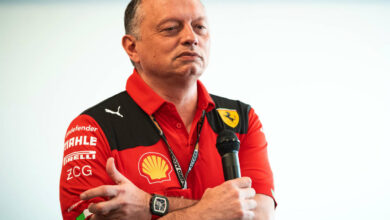Perry McCarthy Unveils His Thoughts on Top Gear’s Cancellation: A Candid Revelation from the Original Stig
In an exclusive interview with Sports Illustrated, Perry McCarthy, the first Stig from Top Gear, openly criticizes the BBC’s handling of the show’s cancellation. He shares insights into the show’s success and the enigma surrounding The Stig.
Key Takeaways:
- Top Gear’s Format and Cancellation: McCarthy acknowledged Top Gear’s need for a new format but criticized the BBC’s abrupt cancellation and lack of clear communication. He noted the show’s commercial viability and expressed frustration over its sudden end.
- Impact of Budget and Commitment: Emphasizing the show’s extensive budget and commitment to quality, McCarthy highlighted how these factors contributed to Top Gear’s global success. He pointed out its broadcast in 215 countries as evidence of its wide-reaching impact.
- The Phenomenon of The Stig: McCarthy expressed pride in his role in creating The Stig, a central yet mysterious figure in the show. He discussed the immense global curiosity about The Stig’s identity, noting it became one of the top internet queries worldwide.

In an exclusive interview facilitated by OLBG with Alex Harrington from Sports Illustrated, Perry McCarthy candidly discusses the recent cessation of the iconic BBC car show, Top Gear. McCarthy, known for his pioneering role as the original Stig, reveals his dissatisfaction with the show’s termination and criticizes the BBC for its lack of transparency.
Top Gear, a blend of automotive enthusiasm, adventure, and entertainment, has been a staple in car-centric television for 46 years. It underwent several transformations, most notably in 2002 with the introduction of presenters Jeremy Clarkson, Richard Hammond, and James May, marking the show’s “Golden Era.” This period saw a shift from a traditional motoring magazine format to a more adventurous and entertaining approach.
The cancellation in 2023 signifies the end of a significant era in television, celebrated for its dynamic presentation and adventurous spirit but also scrutinized for safety concerns and the behavior of its presenters. The show’s end followed Andrew “Freddie” Flintoff’s accident, with the BBC providing minimal explanation for the cancellation.
McCarthy began, “Top Gear, which is the one I’ve always concentrated on, obviously, perhaps it was in need of a new format… But I’m not creative enough to come up with that change… Maybe a rest might be the right idea, although commercially I’m very much against it because it was still an absolute cash cow for the BBC.”
He expressed his disappointment with the manner of the show’s cancellation and the scarcity of information from the BBC: “I’m not happy about the way that it’s been cancelled, and the lack of real information coming out of it from the BBC. They’re just treating everybody like muppets in my opinion.”
Highlighting the financial and qualitative success of Top Gear, McCarthy noted, “They had a huge budget behind it. So there was a very, very big commitment behind making a big TV show… And it was a bit of a self-fulfilling prophecy. They actually got it right, because that’s one of the reasons why the quality of the show was then adopted in 215 different countries around the world.”
Discussing The Stig, McCarthy remarked, “I was always pretty pleased about bringing that together… None of us had any idea, really, how big the show was going to be, or indeed how big the interest in the Stig was going to be.”
The interview reflects McCarthy’s profound disappointment with the cancellation of Top Gear, a decision he deems premature and opaque, especially given the show’s ongoing commercial success. His sentiments echo the feelings of many fans who will deeply miss this iconic show.


